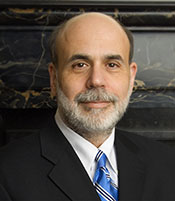|
As the $700-billion bailout package for failed American banks appeared headed for trouble following fierce opposition from both sides of the US Congress. (See: Bush's $700 billion bailout plan for banks faces Congress heat), Federal Reserve chairman Ben Bernanke said that the country is facing "grave threats" to financial stability and warned that the credit crisis has started to damage household and business spending  Imploring US Congress to move quickly as it launched another marathon day of hearings into the Bush Administration's $700 billion financial bailout plan and the state of the economy. "Action by Congress is urgently required to stabilise the situation and avert what otherwise could be very serious consequences for our financial markets and for our economy," Bernanke said in comments to the Joint Economic Committee. Imploring US Congress to move quickly as it launched another marathon day of hearings into the Bush Administration's $700 billion financial bailout plan and the state of the economy. "Action by Congress is urgently required to stabilise the situation and avert what otherwise could be very serious consequences for our financial markets and for our economy," Bernanke said in comments to the Joint Economic Committee.
"Despite the efforts of the Federal Reserve, the Treasury and other agencies, global financial markets remain under extraordinary stress," Bernanke said. The sub-prime mortgage crisis and its aftermath have been assailing the US economy for over a year now. But the recent bloodbath on Wall Street which saw the collapse of some of the most revered names in the financial domain, necessitating government intervention on an unprecedented scale has even the US Federal Reserve chairman worried. The most severe US housing slump since the Great Depression has sent foreclosures soaring, saddling the global financial system with a mountain of bad debt that has threatened to choke off the supply of credit. The Bush administration, supported by the Federal Reserve, wants to use $700 billion of taxpayer money to purchase bad mortgage debt and other securities from financial institutions. However, the proposal is being strongly debated in the legislature over the last few days. "Economic activity appears to have decelerated broadly," Bernanke said, "Stabilization of our financial system is an essential precondition for economic recovery." Moreover, he admitted the current credit situation was tough and that the recent fiascos "will make lenders still more cautious about extending credit to households and businesses''. "The weakness in fundamentals underlying consumer spending suggest that household expenditures will be sluggish, at best, in the near term," Bernanke said. "The continuing decline in house prices reduce homeowners' equity and puts continuing pressure on balance sheets of financial institutions." Bernanke said construction of commercial office buildings and business spending on equipment and software are likely to slow. Slowing growth abroad could reduce the lift the US economy received from exports in the first half, he opined. "If financial conditions fail to improve for a protracted period, the implications for the broader economy could be quite adverse.'' Bernanke also said slowing growth should help moderate inflation pressures. The consumer price index rose 5.4 per cent for the year ending in August. "The inflation outlook remains highly uncertain," he said. "The upside risks to inflation remain a significant concern." The Federal Reserve chief's remarks are the second of three testimonies in two days. Bernanke Tuesday told the Senate Banking Committee in a joint appearance with US Treasury Secretary Henry Paulson that lawmakers should pass the rescue plan quickly. He appeared later Wednesday at the House Financial Services Committee. Financial markets remained under stress amid uncertainty about the legislation's prospects. Stocks were little changed, but demand for US Treasury bills soared on concern that banks were still reluctant to lend to one another. That helped drive the interest rate on one-month bills below zero. Despite investors' skittishness, billionaire Warren Buffett bet that Wall Street would bounce back from its current crisis by buying a $5 billion stake in Goldman Sachs Group. "I am to some effect betting on the fact that the government will do the rational thing and act properly," said Buffett, one of the world's richest men and preeminent stock-pickers. However, he agreed that financial markets remained in a "dangerous situation." (See: Warren Buffett invests $5 billion in Goldman Sachs)
|